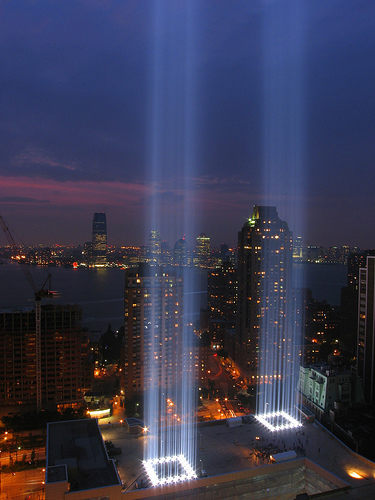The Tribute in Light memorial to 9/11 is an awe-inspiring light installation. As an NYC native, I find it powerful and provocative.
:max_bytes(150000):strip_icc()/wtc-tribute-GettyImages-146886013-56a400115f9b58b7d0d4e0c4.jpg)
Seeing this every year, I’ve always wondered – how do the beams of light stay so straight?
Light from a single source is supposed to spread out, right? Take, for example, a spotlight:

Another example, the waves in the high school classic double-slit experiment:
:quality(75)/curiosity-data.s3.amazonaws.com/images/content/landscape/standard/ea575553-3835-48cd-fa00-829566376372.png)
So why don’t the Tribute in Light beams dissipate like this?!
Answer 1: Big Badboy Lights & Reflectors
Tribute in Light uses a crazy-powerful set of spotlights – the IREOS 7000 SPACE CANNON!

With a name like space cannon, its clear these are some powerful lights – Tribute in Light uses 88 of them (44 per light tower).
The space cannon uses parabolic reflectors to prevent light from diffracting out of the source.

The strong light is therefore concentrated in one direction – straight up. Class note: this is actually a Xenon light – not technically a #BigLED
Answer 2: Light Arrangement
The 88 space cannons (great name, right?) are arranged in two squares:

This arrangement obviously gives an initial square shape for the light, but the arrangement of lights as the border also may create a key element.
By arranging the cannons as a border, it benefits from the additive property of light – keeping the brightness of the light tower internal.

Above is a quick Venn diagram to illustrate this concept with a 4×4 light setup. The more blue the color, the brighter the light should be.
Notice how the corners are additively brighter already. If we imagine the light continuing to dissipate at greater heights, the centralization of the light becomes more apparent:

So there you have it, a quick explanation of the lights behind Tribute in Light.
Giving credit where it’s due, this installation was done by the fantastic Creative Time group and Municipal Art Society of New York
